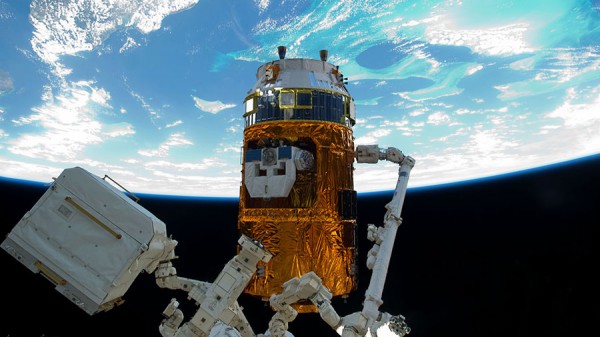By Ana Verayo, | December 12, 2016

Japan’s Kounotori HTV-2 resupply ship is seen in March 2011 in the grips of the Canadarm2 robotic arm. (NASA/JAXA)
During a cargo supply launch on Friday, December 9, Japan sent an electrodynamic net, created from stainless steel and aluminum, to collect Earth's space junk.
There are an estimated 100 million pieces of space debris flying around Earth's orbit, travelling at dangerous speeds of 17,500 miles per hour. Some of them are so tiny that they cannot be detected. But even the smallest ones can cause disaster to satellites and to the International Space Station.
Like Us on Facebook
Japan Aerospace Exploration Agency's (JAXA) cargo ship called the Kounotori was launched around 8:26 a.m. EST on Friday. It blasted off from the Tanegashima Space Center in southern Japan, bringing supplies, equipment and this special net to space. The ship will dock at the ISS for five weeks.
This net is inspired by actual fishnets used in the ocean by fishing vessels. Japan's space agency asked for the help of a local fishnet company to design this space debris net.
How will this fishnet work in space? When electricity from Earth's magnetic field powers this space junk net, it will be able to herd the debris downwards into Earth's lower orbit, where it will re-enter the planet's atmosphere ad burn up.
According to engineer Katsuya Suzuki from the fishnet factory Nitto Seimo, which designed this space net, it uses fishnet plaiting technology that is tough and durable, that can intertwine with very thin materials. This special mesh material is used to create this 2,300-foot net. However, it requires a 5,000 to 10,000 long net to slow down the space junk's traveling speeds.
Apart from this ingenious electrodynamic net solution to capture space debris, the Japanese also conducted a study in 2015 where a team from the Riken Research Institute suggested a method that can disintegrate 3,000 tons of space junk using a fiber optic laser that will be mounted on the ISS.
-
Use of Coronavirus Pandemic Drones Raises Privacy Concerns: Drones Spread Fear, Local Officials Say

-
Coronavirus Hampers The Delivery Of Lockheed Martin F-35 Stealth Fighters For 2020

-
Instagram Speeds Up Plans to Add Account Memorialization Feature Due to COVID-19 Deaths

-
NASA: Perseverance Plans to Bring 'Mars Rock' to Earth in 2031

-
600 Dead And 3,000 In The Hospital as Iranians Believed Drinking High-Concentrations of Alcohol Can Cure The Coronavirus

-
600 Dead And 3,000 In The Hospital as Iranians Believed Drinking High-Concentrations of Alcohol Can Cure The Coronavirus

-
COVID-19: Doctors, Nurses Use Virtual Reality to Learn New Skills in Treating Coronavirus Patients







